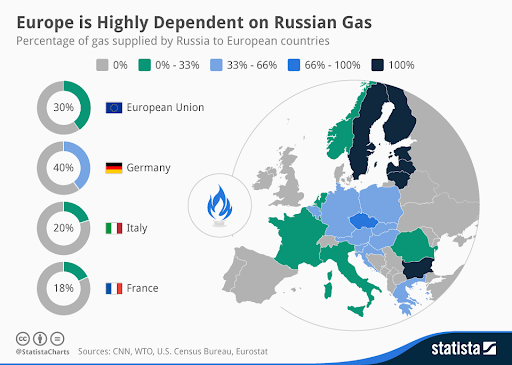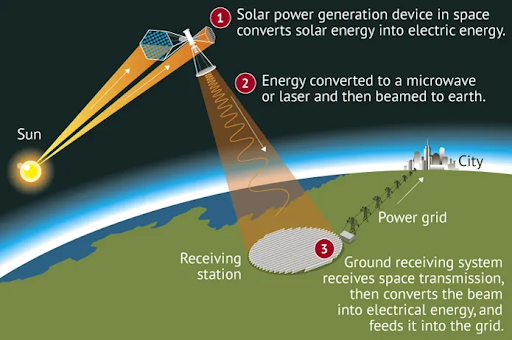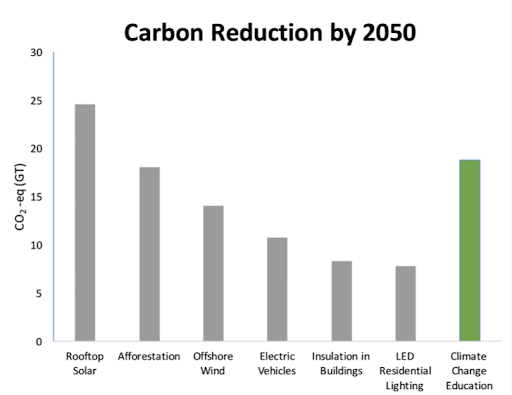
Happy Tuesday. The stories this week are out of this world…
In today’s edition:
💰Converting e-waste to coins
🛰 Power stations in space
📚 Student climate champions

Reducing EU reliance on Russian Gas
The US and the European Commission announced a joint Task Force to strengthen European energy security.
The what: The Task Force will aim to bring more US Liquified Natural Gas (LNG) to Europe, lower LNG carbon intensity AND permit and finance more US LNG export.
LNG vs Coal: Liquid Natural Gas is touted as a ‘bridge’ fuel in the shift from coal to renewables due to producing around half the CO2. Yet, research suggests the benefits vs fossil fuels are partly erased by methane leaks (25x more potent warming than carbon dioxide in theshort term)
Concerns remain… As this new deal may streamline approvals for more LNG subsidies – money that could instead support renewables and electrification.

Google launches sustainability fund for startups in Asia
The Problem: Asia is more exposed to physical climate risk than other parts of the world – McKinsey predicts by 2050, $4.7tn of Asia’s GDP could be annually at risk due to extreme heat and humidity.
Finding a solution: Google has launched a $6m sustainability fund, alongside mentoring and access to new tech, to support non-profit startups from Asia to address issues such as pollution, waste and renewables.
Not the first rodeo… Google has previously invested in climate-tech startups in the region – like Gringgo. It is no surprise given 200 startups valued over $1bn+, (aka Unicorns) originated from Asia last year alone.
DHL double down on Sustainable Aviation Fuel (SAF)
DHL has confirmed strategic collaborations with bp and Neste, to provide more than 800 million litres of SAF (produced from sustainable feedstocks e.g. cooking oil; solid waste from homes, food scraps) to decarbonise its airline freight business. The deal is one of thelargest to date and will allow DHL to avoid two million tonnes of carbon dioxide emissions every year = similar to emissions produced by 12,000 carbon-neutral long-haul flights.
🤖 Future of Tech (1-minute read)
UK Gov plans for a solar power station in space
The situ: The UK government is considering a £16bn proposal to build a solar power station in space as the technology featured in theGov’s Net Zero Innovation Portfolio.
How does it work? A spacecraft with solar panels generates electricity which is wirelessly transmitted to Earth through radio waves. These radio waves are then coveted into electricity and delivered to the power grid.
Benefits: The solar power station would be illuminated by the sun 24/7 meaning a continuous supply of electricity. However… critics have pointed out that investment in domestic solar subsidies would be more beneficial.

Royal mint prospecting for gold from e-waste
Challenge: Each year, more than 50 million tonnes ($57bn dollars) of electronic waste is produced globally, with less than 20 per cent currently being recycled = more resource extraction + more environmental damage.
A world-first: The Royal Mint, thecommemorative coin maker, has revealed plans to build a “world-first” plant in South Wales to recover gold from UK electronic waste. Thepatented process will recover more than 99 per cent of gold within thecircuit boards to generate hundreds of kilograms of gold per year and create 40 local jobs.
Why? Supply chain instability and soaring prices mean new sources of precious metals are increasingly prioritised – A win-win-win for people, planet and profit.
💡 Deep Dive(1-minute read)
Students climate champions
With young people standing to lose the most from climate change, it’s not surprising they’re at the forefront of efforts to prevent environmental breakdown. A Financial Times report has listed students from around the world who are tackling the climate threat:
Water from Air: Students from the Eastern Mediterranean International School in Tel-Aviv have created a device that converts moisture in the air into drinkable water. While theheat created as by-product of the process is used to produce electricity.
Tabanca Solar Project: A lack of energy sources in Guinea Bissau, West Africa means young people live in dark homes. While on placement in a Portugese school, Bissau-Guinean students designed a renewable energy device from water bottles to create solar lamps that store energy to power lights at night.
- Green School, Indonesia…is an international school in Bali where the students study in sustainable bamboo buildings and are taught how to build and install solar panels, which then provide electricity for the campus.
Why’s this important? On top of finding sustainable solutions, research shows that if 16% of high school students in high- and middle-income countries were to receive climate change education, we could see a nearly 19 gigatonne reduction of carbon dioxide by 2050 – theequivalent weight of around 100 blue whales.

💭 Little Bytes
Quote: “Conflict and hunger are closely intertwined – when one escalates, the other usually follows. As in any crisis, it is the poorest and most vulnerable who are hardest hit, and in our globalized world, theimpact of this conflict will reverberate across continents.” Gilbert Houngbo, President of theUnited Nations’ International Fund for Agricultural Development (IFAD)
Stat: The ocean will have 4 times more plastic waste in it by 2050 – WWF
Watch: How the protein and fats from algae could be the future of sustainable food
🗞 In other news…
A new approach to recycling textiles made from polyethylene terephthalate (PET) can offer a 60% improvement on environmental impact of these materials at end of life
Digital, non-fungible tokens are being used to raise money for scientific research.
Toilet to Tap: wastewater is being purified to create drinking water for locals in San Diego, reducing reliance on the importation of freshwater.
Singapore is using floating, wireless battery charging and swapping concepts to support the decarbonisation marine logistics.
🎣 Deal Room
Dresden-based Sunfire gets€195M in Series D funding for its renewable energy platform, renewables manufacturing capacity and has scaling of its hydrogen technologies
San-Fran based Span.ioclosed a $90 million Series B fundraising round to develop its Home suite of energy products and solutions to accelerate electrification of homes.
Nairobi-based ApolloAgriculture, raised $40M in Series B funding for its use of satellite imagery data and machine learning to underwrite loans to Kenya’s small-scale maize farmers
London-based, Climate X, raised $5.4M funding for its climate risk analytics platform enabling decision-makers to place climate mitigation and resilience at the heart of their strategy
- Swedish startup, Bower, raised €4.1M in late seed funding for its reward system to encourage recycling




